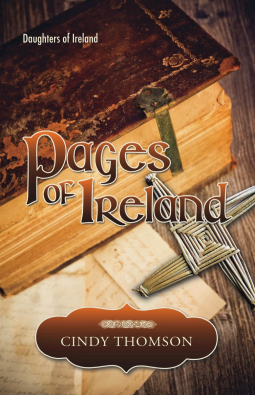
Pages of Ireland
Daughters of Ireland) (Volume 2
by Cindy Thomson
This title was previously available on NetGalley and is now archived.
Send NetGalley books directly to your Kindle or Kindle app
1
To read on a Kindle or Kindle app, please add kindle@netgalley.com as an approved email address to receive files in your Amazon account. Click here for step-by-step instructions.
2
Also find your Kindle email address within your Amazon account, and enter it here.
Pub Date Jul 10 2016 | Archive Date Feb 22 2017
Description
In sixth-century Ireland, books are rare treasures.
Aine, a young woman unwillingly pledged to marry, believes the book is a talisman with the power to change her circumstances. When she steals it from her betrothed’s clan, desperate to use it to help her mother’s impoverished people, events tumble out of control. She seeks help from Brigid, the woman who rescued her long ago, but doing so puts an entire monastery at risk as the king deploys his army to get the book back.
The formerly banished druid Ardan hopes the book can be traded for revenge, but a mysterious force curses him with a reoccurring mark in the shape of Brigid’s famous reed cross. Is it the power of a vengeful god or the command of the book that is causing his anguish?
While many seek to possess the book, it appears to choose who will hear its words. No one in Ireland will know the power of the words written on its pages if the book does not survive the battle.
Available Editions
| EDITION | Ebook |
| ISBN | 9781535021586 |
| PRICE | $3.99 (USD) |
Links
Average rating from 1 member
Featured Reviews
 Tara S, Reviewer
Tara S, Reviewer
One of my biggest pet peeves when authors decide to use real people and events from history in their fictional tales is when they change the essence of who those people were so really they’re only using the “celebrity” and not the truth.
Then you have wonderful authors like Cindy Thomson who are able to use their talented imaginations to create an entire fictionally based story around history but stick to the truth of the time and the people so well it’s nearly impossible to know where she begins and the past ends.
Thomson did a fantastic job in creating characters that breathe accuracy to the time and culture of ancient Ireland. Her dialogue, although it took some getting used to as she set the tone and sentence structure to the times, was easy to understand and follow. I loved how she created such a strong, intense character in Aine particularly since it’s most often that men get all the glory and focus in historical fiction even though countries like Ireland have a plethora of female heroes to choose from. Kudos to Thomson for showcasing some of that fierceness by creating a representation of that in Aine as she stood up to royalty, warriors and her peers for her beliefs.
I know most of what she created around Brigid was illusory but I liked that she kept true to the integrity of the person and what we know of her from the little that survived in Irish history. It helps to stay in the story when you don’t get angry at the author for having someone that well known do something they’d never do in a million years which only reminds you that you’re reading a book instead of getting immersed in a world different from your own.
Her plot line made sense, was straightforward and moved fairly quickly for a historical novel. I also felt it picked up from its predecessor really well although you really need to make sure you read the first book to truly appreciate the whole context of the second.
Thomson handled the burgeoning Catholicism and well-practiced Druidic faith evenly without coming off too biased one way or the other so it truly felt like a story being told in the context of that time; not an author with an agenda.
Overall I’d recommend this and its predecessor for anyone who likes to read about ancient Irish history. Although this is a work of fiction, and therefore it should not be taken as completely historically accurate, Thomson handled the past with grace and honor.



